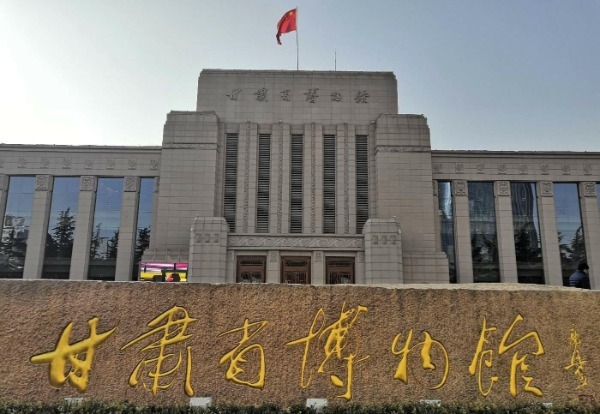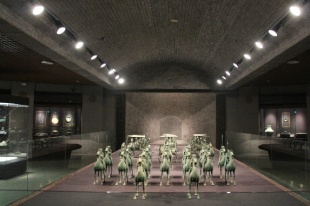Gansu Provincial Museum


Gansu Provincial Museum, sitting on the bank of the Yellow River, is one of the earliest integrative museums in China. It was previously the Gansu Scientific Education Center founded in 1939.
In 1950, the center was renamed to Northwest People's Science Museum and later in 1956 renamed again to Gansu Provincial Museum.
Two years later, it moved into a new venue. In 1999, the Gansu provincial government invested 150 million yuan on the reorganization and expansion of the museum.
Covering a land area of 108 mu and a floor area of 28,500 sq m, the building after renovation hosts 18 exhibition areas and other facilities such as warehouses and labs. Boasting a classic and user-friendly design, the new building opened to the public on December 26, 2006, and has been offering free entry since March 2008.
Gansu Provincial Museum has a rich collection of cultural relics, fossils and specimens with distinguished features thanks to the abundant cultural relics and heritage in Gansu province. It houses a total of over 80,000 pieces or sets of valuable cultural relics and natural specimens, including 702 pieces or sets of first-class cultural relics (including 16 national treasures), 2,625 pieces or sets of second-class cultural relics, and 48,129 pieces or sets of third-class cultural relics.
Among a great regional collection ranging from ancient to modern times, the most distinct pieces held by Gansu Provincial Museum include painted pottery from the Neolithic Age, bamboo slips from the Han Dynasty, Silk Road documents and treasures of the Han and Tang dynasties, Buddhist artwork, and paleontological fossils. Bronze Galloping Horse from the Eastern Han Dynasty and the portrait bricks painted with courier figures unearthed from a tomb in Wei and Jin Dynasties have been recognized as a national tourism trademark and a post trademark. The museum now hosts five permanent exhibitions, namely Civilization Along the Silk Road Section in Gansu, Gansu Painted Pottery, Paleontological Fossils in Gansu, Gansu Buddhist Arts, and Red Gansu – To 1949, to demonstrate the profound history and culture in the province.





































